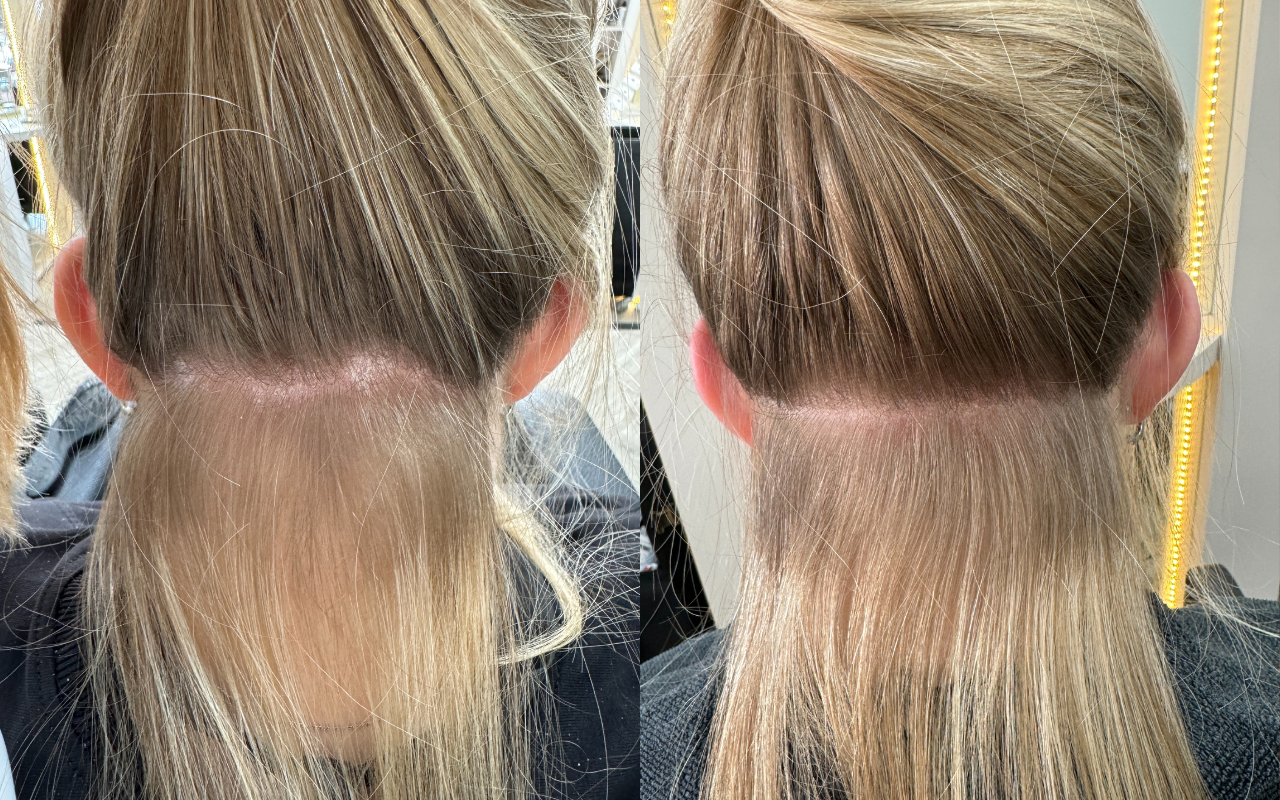Sugar and hair loss: What's the link?
Hair loss is an increasingly more common concern that affects people of all ages and genders. While genetics, hormonal imbalances, and lifestyle factors play significant roles in hair loss, new research in the area of nutrition suggests that the food we consume, particularly sugar, may also have an impact on the health of our hair.
In this article, we'll explore the link between sugar and hair loss and discover how excessive sugar consumption could be contributing towards a growing number of hair loss issues.
Understanding the Hair Growth Cycle
Before delving into the sugar-hair loss connection, it’s a good opportunity to give you a speedy crash course on the ‘hair growth cycle’ in order to be better able to comprehend how sugar can affect your hair.
The human head has around 100,000 hair follicles that lay beneath the skin of the scalp. These hair follicles undergo a continuous cycle of growth, rest, and shedding. The Anagen phase is the active growth phase, lasting for several years, while the Telogen phase is the resting phase, which lasts a few months before entering the Catagen, shedding phase.
After the follicle has shed a hair, a new strand begins its journey of Anagen, growth phase again. For healthy hair, it is crucial to maintain a balanced growth cycle, however various factors, including nutrition, can influence this delicate process. Understanding the ways the hair growth cycle can be affected can actually empower you to make choices that help you to maximise your hair growth cycle. Interestingly, these choices will likely have a positive impact on you overall health and well-being also.

Can high sugar cause hair thinning?
High sugar intake can absolutely be a contributing factor for hair loss, particularly in those who are genetically predisposed to hair thinning and pattern baldness.
Several mechanisms connect high sugar consumption to hair loss so let's take a look at how high sugar intake affects the body which in turn disrupts the normal functioning of bodily processes including the hair growth cycle.
The endocrine system -The Impact of Sugar on Hormones:
Hormones are responsible for the normal running of our bodies and when our hormones are balanced we enjoy perfect health and harmony. Sugar, especially refined sugars found in processed foods and sugary beverages, can cause significant fluctuations in blood sugar levels. When we consume sugary foods, our bodies rapidly digest them, leading to a surge in blood sugar levels, (known as a blood sugar spike) followed by a quick insulin response to regulate glucose levels. These frequent spikes and crashes in blood sugar can disrupt hormonal balance, including insulin and androgen hormones.
Insulin Resistance and Hair Loss:
Consistently high blood sugar levels can lead to insulin resistance, where the body's cells become less responsive to insulin. This condition has been linked to an increase in androgen production, particularly dihydrotestosterone (DHT) a derivative of testosterone. DHT is a potent hormone that can shrink hair follicles, leading to a condition called androgenic alopecia or male/female pattern hair loss. In individuals genetically predisposed to hair loss, excessive sugar consumption may exacerbate the condition.
Inflammation and Oxidative Stress:
Sugar can trigger inflammation in the body, contributing to chronic inflammatory conditions. In the scalp, this inflammation can disrupt the normal hair growth cycle, leading to increased shedding and hair thinning. Moreover, the production of free radicals resulting from sugar metabolism can cause oxidative stress, damaging hair follicles and impeding their ability to produce healthy hair strands.
Nutrient Deficiencies and Sugar - Which vitamin deficiency causes hair loss?
Excessive sugar consumption can crowd out nutrient-dense foods in the diet. Nutrients like biotin, zinc, iron, and vitamins A, C, and E are essential for hair health and growth. A diet high in sugar and low in essential nutrients can deprive hair follicles of the vital nourishment they need, leading to weakened hair strands and eventually even hair loss.
Can you reverse hair loss from high sugar?
The good news is that hair loss from high sugar is reversible providing you make changes to your diet and lifestyle, and the sooner the better as long term hugh sugar intake can lead to prolonged health issues. So you may be wondering: Does cutting down sugar help with hair growth? The answer is yes. Here are some practical ways you can improve your diet in order to restore your hair's strength, fullness and vitality.
Reduce Added Sugar Intake: Limit the consumption of sugary foods, beverages, and processed snacks. Opt for whole, nutrient-rich foods to support hair health.
Read Food Labels: Be mindful of hidden sugars in packaged foods. Ingredients like high-fructose corn syrup, sucrose, and dextrose indicate added sugars.
Choose Complex Carbs: Opt for whole grains, fruits, and vegetables, which release sugar more slowly, preventing rapid blood sugar spikes.
Opt for Natural Sweeteners: When craving sweetness, use natural sweeteners like honey, maple syrup, or stevia in moderation.
Nourish Your Hair: Consume a balanced diet rich in vitamins, minerals, and proteins that support healthy hair growth.
Expert tip: Starting your meal with vegetables can help regulate sugar absorption. With their high fibre content and low glycemic index, vegetables slow down the digestion of sugars, leading to a steadier rise in blood sugar levels.
Additionally, the nutrients and water in vegetables increase satiety, reducing the overall consumption of calories and sugars during the meal. The combination of fibre, nutrients, and a slower digestive process makes vegetables an effective choice for supporting blood sugar control and promoting overall health.
How do I stop my hair from falling out?
See also this article - What causes sudden hair thinning and hair loss?
What are the best vitamins and minerals for hair growth?
Several vitamins play a crucial role in promoting healthy hair growth. These vitamins support the structure, strength, and overall health of your hair follicles. In addition to vitamins, minerals also play a vital role in promoting healthy hair growth. Here are some of the key vitamins and minerals that contribute to strong and vibrant hair:
Vitamins:
Vitamin C: Vitamin C is an antioxidant that supports collagen production, which is important for hair structure. It also aids in the absorption of iron, a mineral necessary for hair growth.
Vitamin E: Vitamin E promotes blood circulation in the scalp, which helps improve hair follicle health. It also has antioxidant properties that protect hair cells from damage.
B-Vitamins (Biotin, B6, B12): Biotin, in particular, is often associated with hair health, as it's involved in the production of keratin, a protein that forms the structure of hair. B-vitamins also play a role in supporting overall scalp health.
Vitamin D: Vitamin D is important for hair follicle cycling and can help stimulate hair follicles to promote new hair growth.
Vitamin K: Vitamin K supports hair health by aiding in the transport of calcium, which is necessary for hair growth.
Minerals:
Iron: Iron is essential for delivering oxygen to hair follicles and promoting healthy cell growth. A deficiency in iron can lead to hair thinning and hair loss.
Zinc: Zinc is crucial for maintaining the health of hair follicles and supporting cell division. It helps prevent hair loss and contributes to the overall strength of hair strands.
Selenium: Selenium is an antioxidant that helps protect hair follicles from damage caused by oxidative stress. It also plays a role in maintaining a healthy scalp.
Magnesium: Magnesium supports the body's utilisation of other vitamins and minerals that are important for hair growth. It helps maintain strong hair strands and supports scalp health.
Copper: Copper assists in the production of melanin, the pigment responsible for hair colour. It also contributes to the overall health of hair follicles.
Silica: Silica is a trace mineral that helps maintain the strength and thickness of hair. It's involved in the formation of collagen and supports the health of hair strands.
Calcium: Calcium plays a role in promoting hair growth by supporting hair follicle health and the transport of essential nutrients to the scalp.
Potassium: Potassium helps regulate blood circulation and fluid balance, which are important for maintaining a healthy scalp environment.
Iodine: Iodine is essential for the proper functioning of the thyroid gland, which plays a role in regulating hair growth and preventing hair loss.
Manganese: Manganese contributes to the production of enzymes that support hair growth and overall hair health.
In conclusion, the connection between sugar consumption and hair loss sheds light on the intricate relationship between diet and hair health. Excessive sugar intake can lead to insulin resistance, inflammation, and oxidative stress – all of which contribute to the weakening of hair follicles and potential hair thinning. By making mindful dietary choices and reducing refined sugar consumption, individuals can help create an environment conducive to healthy hair growth.
A balanced diet rich in essential nutrients, vitamins, and minerals, coupled with proper hair care, remains the cornerstone of maintaining lustrous locks and a vibrant scalp. Remember, a holistic approach to health not only benefits your overall well-being but also nurtures the vitality of your hair from within.
If you have any questions we encourage you to get in touch with us and we will get back to you as soon as we can. You can reach us by emailing our team:
Hello@wearecentred.com
Follow our journey and stay up to date with the latest healthy hair tips and tricks by our experts via our social channels - @wearecentred





